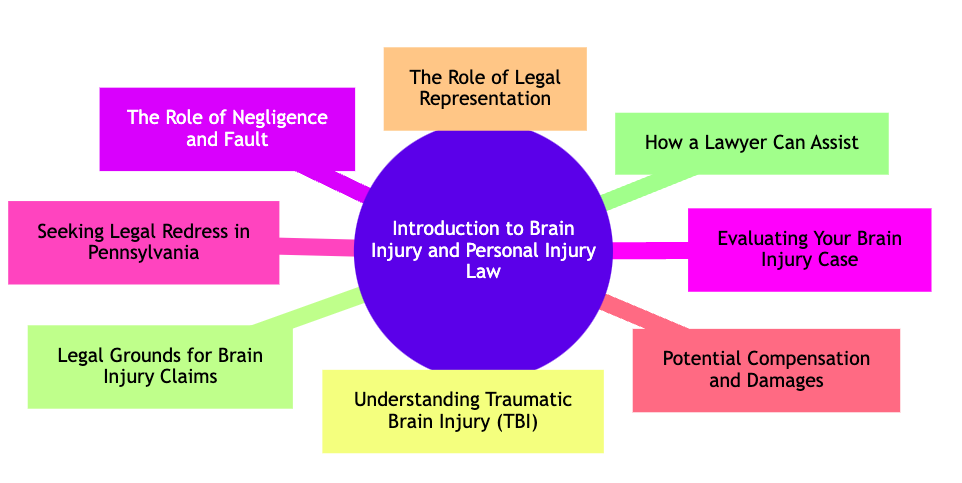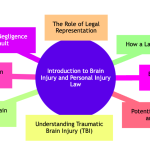Brain Injury and Personal Injury Law
Traumatic Brain Injuries (TBIs) represent a significant concern in personal injury law, especially in Pennsylvania. These injuries, often invisible, can have profound and lasting impacts on an individual's life. Understanding the legal landscape in Pennsylvania is crucial for anyone affected by a brain injury, whether it's from an auto accident, a fall, or other traumatic events. This article aims to shed light on the complex interplay between brain injuries and the legal system in Pennsylvania.
Key Takeaways:
- Brain Injuries Can Be Complex: Understanding their legal implications is critical.
- TBIs Vary Widely: From mild concussions to severe injuries, each case is unique.
- Legal Processes Are Intricate: Navigating them requires expertise and precision.
- Compensation is Possible: Compensation depends on the specifics of the case.
- Pennsylvania Law Is Specific: Local laws significantly influence outcomes.

Understanding Traumatic Brain Injury (TBI)
What is a Traumatic Brain Injury?
A Traumatic Brain Injury (TBI) is a disruption in normal brain function caused by a blow or jolt to the head. TBIs range from mild concussions, often with temporary effects, to severe injuries that can result in prolonged unconsciousness or amnesia.
Types of TBIs
TBIs are generally categorized as mild, moderate, or severe, depending on factors like the length of loss of consciousness and the severity of symptoms. Each type presents its legal considerations.
Short-term and Long-term Impacts
Short-term effects might include headaches and dizziness, while long-term impacts can be as serious as permanent cognitive impairment. Understanding these impacts is vital for legal claims.
Legal Grounds for Brain Injury Claims
In Pennsylvania, the legal foundation for a brain injury claim often hinges on two key concepts: negligence and duty of care.
Negligence: This is the failure to exercise reasonable care, which might include actions like driving recklessly or failing to maintain safe premises. Demonstrating the other party's negligence is crucial for a successful brain injury claim.
Duty of Care: This refers to a legal obligation to ensure the safety of others. In brain injury cases, determining if the at-fault party had a duty of care and breached it is essential.
Evaluating Your Brain Injury Case
Assessing Liability
Determining who is at fault is a critical first step. Was there a breach of duty leading to the injury? The answer to this question can shape the entire case.
Importance of Medical Documentation
Medical records play a crucial role in substantiating the extent and impact of the brain injury. Accurate and comprehensive medical documentation strengthens a claim significantly.
Key Considerations in Evaluation:
- Circumstances of the Injury: Details of how the injury occurred.
- Medical Evidence: Documentation and expert opinions.
- Impact on Life: How the injury affects daily living and earning capacity.
- Legal Precedents: Relevant past cases and outcomes in Pennsylvania.
By thoroughly understanding these aspects, individuals affected by brain injuries can navigate the legal system more effectively and advocate for their rights and needs.
Seeking Legal Redress in Pennsylvania
In Pennsylvania, the journey to legal redress for a brain injury weaves through a series of specific legal processes and requirements. The state's laws provide a framework for victims to seek compensation, but it's essential to understand the nuances of these laws and how they apply to brain injury cases. The path to justice involves several critical steps, from documenting the injury to filing a lawsuit within Pennsylvania's statute of limitations.
Steps to Take:
- Document the Injury: Gather all medical records and evidence related to the injury.
- Understand the Statute of Limitations: In Pennsylvania, you have a limited time to file a lawsuit.
- Determine Liability: Identify who is legally responsible for the injury.
- Consult a Lawyer: Seek professional advice to navigate the legal system.
- File a Claim: Initiate legal proceedings in the appropriate Pennsylvania court.
Potential Compensation and Damages
Victims of brain injuries in Pennsylvania can pursue various types of compensation. These include medical expenses, lost wages, and damages for pain and suffering. The evidence plays a pivotal role in establishing the extent of these damages, making thorough documentation and expert testimony indispensable.
Table 1: Types of Compensation
|
Type of Compensation |
Description |
|
Medical Expenses |
Costs for medical treatment, rehabilitation, and ongoing care. |
|
Lost Wages |
Income lost due to the inability to work. |
|
Pain and Suffering |
Compensation for physical pain and emotional distress. |
|
Punitive Damages |
Awarded in cases of egregious negligence to punish the wrongdoer. |
Impact on Quality of Life
The impact of a brain injury on quality of life is a crucial consideration in determining compensation. This encompasses both physical limitations and emotional trauma.
The Role of Legal Representation
Navigating a brain injury claim in Pennsylvania is a complex process that demands legal expertise. An experienced lawyer can guide you through each step, ensuring your rights are protected and your case is presented effectively. They bring invaluable knowledge of state laws, procedural rules, and the nuances of negotiating with insurance companies.
Final Thoughts - Take the Next Steps
Pennsylvania brain injury cases require careful navigation of legal complexities and an understanding of the state's specific laws. Seeking professional legal advice is crucial for anyone pursuing such a claim. For residents in Lancaster, PA, and surrounding areas, RG Injury Law stands out as a reliable source of legal expertise, ready to support victims in their journey toward justice and fair compensation.





